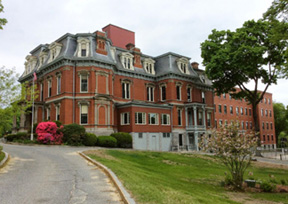Key Event in Serial Killer Bill Bonin’s Childhood—Two Years, 1953-55, at Franco-American Orphanage in Lowell, Mass.
March 11, 2023
Vonda3310
0 Comments
 Los Angeles, CA—During the writing of Without Redemption: Creation & Deeds of Freeway Killer Bill Bonin, His Five Accomplices & How One Who Escaped Justice, authors Vonda Pelto, Ph.D. and Michael B. Butler sought to discoverer the mystery of why he became a serial killer. Able to track his personal evolution, by mining a trove of official investigative docs and Bonin’s diaries, they found a number of key episodes that truly mattered. For example, Bonin’s two-year stay, from ages 5 to 7, at the Franco-American Orphanage in Lowell, Massachusetts is a formative and unappreciated event by those seeking a better understanding of the infamous Freeway Killer Bill Bonin.
Los Angeles, CA—During the writing of Without Redemption: Creation & Deeds of Freeway Killer Bill Bonin, His Five Accomplices & How One Who Escaped Justice, authors Vonda Pelto, Ph.D. and Michael B. Butler sought to discoverer the mystery of why he became a serial killer. Able to track his personal evolution, by mining a trove of official investigative docs and Bonin’s diaries, they found a number of key episodes that truly mattered. For example, Bonin’s two-year stay, from ages 5 to 7, at the Franco-American Orphanage in Lowell, Massachusetts is a formative and unappreciated event by those seeking a better understanding of the infamous Freeway Killer Bill Bonin.
Without Redemption, the most detailed historical biography about Bonin, let alone any serial killer, provides lots of information vital to truly understanding the how and why of the unfeeling murderer Bill Bonin.
Here is an excerpt from the Without Redemption regarding Bonin’s stay,
with his older brother, at the orphanage.
Franco-American Orphanage, September 1953 to May 1955
 Alice and Robert Bonin had a dual problem on their hands. Their two oldest sons, Bobby nine and Bill six, were acting out, they were out of control and becoming seriously delinquent. Pressure to control their children’s behavior began coming from all sides: neighbors, local police, probation officers, school authorities and the Church.
Alice and Robert Bonin had a dual problem on their hands. Their two oldest sons, Bobby nine and Bill six, were acting out, they were out of control and becoming seriously delinquent. Pressure to control their children’s behavior began coming from all sides: neighbors, local police, probation officers, school authorities and the Church.
The children were lucky because their father spent little time at home. He continued to beat them over the slightest provocation, clearly not understanding the value of or how to offer appropriate guidance, discipline and love. Alice kept drinking, chain smoking and frequenting the local bingo parlor, equally out of her depth when it came to properly caring for her sons. Inept at the demands of giving her sons the protection, love and attention they required and needed.
All of the elements in the Bonin’s lives combined to force a decision serving multiple purposes; satisfy local authorities, give the boys a structured environment, relieve pressure on the parents and keeping the boys away from their father’s physical abuse.
On September 6, 1953 the Bonin’s two older sons were placed in the Franco-American Orphanage at 357 Pawtucket Street in Lowell, Massachusetts, a Catholic boarding school for children, to be cared for by Nuns with a mandate from society and God.
Most of the children placed there were not orphans, rather coming from families unable to care for or control their children. The facility was maintained by the Catholic Archdiocese of Boston and run primarily by Nuns. Located 83-miles north of Willimantic, the school consisted of a three-story red brick building complex situated on the banks of the Merrimack River.
Originally built as a stately mansion in the 1870s by prominent Lowell industrialist, Frederick Ayer, it was designed in the Victorian style of the time to reflect Ayer’s wealth and power. Vacant for eighteen years before it was purchased in 1908 by the Missionary Oblates of Mary Immaculate, it was to provide a home for orphaned children of Franco-Americans, thus ensuring a continuity of French-Canadian heritage from families who settled in Lowell from Canada.
During a campaign stop for John F. Kennedy’s second senatorial campaign, in October 1958, Jacqueline Kennedy visited the facility, and a picture was taken with her and all the students.
When Bobby and Bill arrived, the facility was surrounded by a 15-foot-high chain link fence covered with metal nubs and topped by loops of barbed wire, looking more like a prison than an orphanage. Newcomers were teased, one student recalling “it took a while to learn not to cry.” Passersby viewed the sad faces of the confused children pressed against the fence, looking for help which never materialized.
They spent almost two-years at the orphanage. Bill attended grades one thru three in this structured environment and maintained acceptable grades. Cut off from the outside world, the Nuns running this rather scary institution could and did treat the children as they pleased. A daily routine consisted of “morning wake-up, go to church, eat, go to school, go to church, go to lunch, go to school, go to church, go to dinner, go to church, then bedtime. Once you went to bed at night, you were not allowed to get up and would be physically punished if you did.”
Their lives were strictly regimented with playgrounds segregated by sex and age. Should boy and girl siblings see each other through the playground fence and attempt communication, severe punishment followed; one incident saw a young girl, who tried to talk to her brother, “jerked away from the fence by her hair and severely beaten.” Siblings might see each in the community dining room but were not allowed “to sit together or talk with each other.” Bill became severely depressed. He was scared and lonely, not allowed any interaction with his brother.
Perimeter fencing kept children inside and served as a punishment tool. When Bill misbehaved, the Nuns forced him to hit the fence with his fists until his knuckles bled, the fingers becoming unmovable once scabs formed. When subjected to this severe punishment, children “cried and begged not to have to hit the fence.”
Begging, crying or pleading brought neither sympathy nor relief from the Nuns, whose Christian charity came from a sense of their duty to the children. They never held, hugged or offered any emotional support. A number of sisters spoke only French, leaving many of the children unable to understand them; of course, blood curdling anger and punishment is the same in any language.
 Los Angeles, CA—During the writing of Without Redemption: Creation & Deeds of Freeway Killer Bill Bonin, His Five Accomplices & How One Who Escaped Justice, authors Vonda Pelto, Ph.D. and Michael B. Butler sought to discoverer the mystery of why he became a serial killer. Able to track his personal evolution, by mining a trove of official investigative docs and Bonin’s diaries, they found a number of key episodes that truly mattered. For example, Bonin’s two-year stay, from ages 5 to 7, at the Franco-American Orphanage in Lowell, Massachusetts is a formative and unappreciated event by those seeking a better understanding of the infamous Freeway Killer Bill Bonin.
Los Angeles, CA—During the writing of Without Redemption: Creation & Deeds of Freeway Killer Bill Bonin, His Five Accomplices & How One Who Escaped Justice, authors Vonda Pelto, Ph.D. and Michael B. Butler sought to discoverer the mystery of why he became a serial killer. Able to track his personal evolution, by mining a trove of official investigative docs and Bonin’s diaries, they found a number of key episodes that truly mattered. For example, Bonin’s two-year stay, from ages 5 to 7, at the Franco-American Orphanage in Lowell, Massachusetts is a formative and unappreciated event by those seeking a better understanding of the infamous Freeway Killer Bill Bonin. Alice and Robert Bonin had a dual problem on their hands. Their two oldest sons, Bobby nine and Bill six, were acting out, they were out of control and becoming seriously delinquent. Pressure to control their children’s behavior began coming from all sides: neighbors, local police, probation officers, school authorities and the Church.
Alice and Robert Bonin had a dual problem on their hands. Their two oldest sons, Bobby nine and Bill six, were acting out, they were out of control and becoming seriously delinquent. Pressure to control their children’s behavior began coming from all sides: neighbors, local police, probation officers, school authorities and the Church.